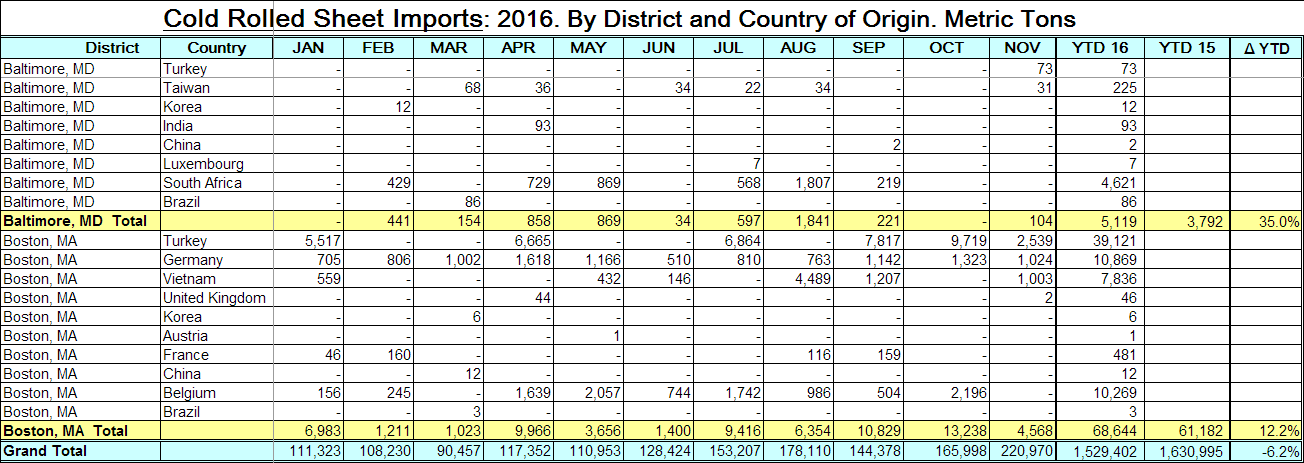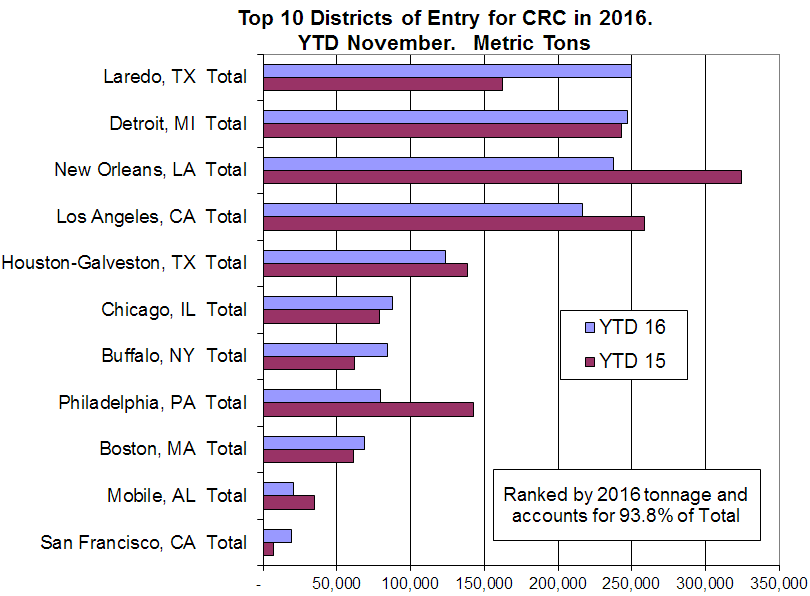Prices

January 10, 2017
Analysis of Sheet Steel Imports by District of Entry and Source
Written by Peter Wright
We believe that misinformation (or lack of) about regional steel import volumes is often used to influence purchase decisions. Our intent with this analysis of tonnage by district of entry is to describe in detail what is going on in a company’s immediate neighborhood and thus provide a negotiating advantage for for premium subscribers.
![]() We are now publishing monthly data in the Imports/Exports section of our website that breaks down the tonnage of the four major sheet products (hot rolled, cold rolled, hot dipped galvanized, and other metallic coated) into the port of entry and country of origin in metric tons. This data set is large, therefore we will make no attempt to provide a commentary. Each readers interest will be different and he/she simply needs to select one of the four products then find the nearest port(s) of entry to see how much came into their region each month and where from. It is clear from these detailed reports that the growth of tonnage entering a particular district in many cases is completely different to the change in volume at the national level.
We are now publishing monthly data in the Imports/Exports section of our website that breaks down the tonnage of the four major sheet products (hot rolled, cold rolled, hot dipped galvanized, and other metallic coated) into the port of entry and country of origin in metric tons. This data set is large, therefore we will make no attempt to provide a commentary. Each readers interest will be different and he/she simply needs to select one of the four products then find the nearest port(s) of entry to see how much came into their region each month and where from. It is clear from these detailed reports that the growth of tonnage entering a particular district in many cases is completely different to the change in volume at the national level.
The table included here (click to enlarge) is a small extract from the data sheet for CRC coil. It describes the tonnage that has come in through Baltimore and Boston and the grand total. It shows where it came from, the YTD tonnage and the YTD change compared to 2015. The grand total volume of CRC through November was down by 6.2 percent but Baltimore was up by 35 percent and Boston up by 12.2 percent.
The differences between regions and the discrepancy between each region and the national total is why we think it important for both market understanding and negotiating position to know what is going on in your own back yard.
The chart shows graphically the tonnage of CRC that entered the top 10 districts in YTD November for 2015 and 2016 and is ranked by 2016 tonnage. These 10 districts account for 93.8 percent of the grand total in the first 11 months of 2016. Laredo has received the most tonnage in 2016 and is up by 53.8 percent YTD. New Orleans and Philadelphia were down by 26.8 percent and 44.0 percent respectively through November.
The data in these detailed reports is compiled from tariff and trade data from the U.S. Department of Commerce and the U.S. International Trade Commission. Our other import reports are sourced from U.S. Department of Commerce, Enforcement and Compliance, otherwise known as SIMA (the Steel Import Monitoring and Analysis system). In the development of these reports by district and source country we have discovered that the SIMA data for HRC and CRC contains some high alloy steel such as stainless and tool steel which have been miss classified at the ports. These alloy steels are not included in in our detailed reports which results in a discrepancy between the two data sets for CRC in particular and for HRC to a lesser degree.









